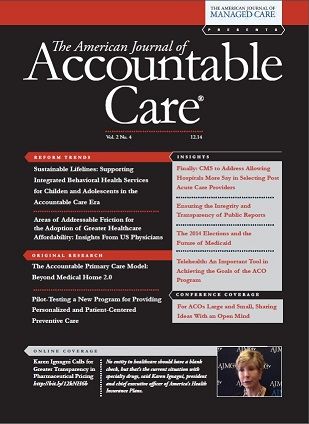- Center on Health Equity & Access
- Clinical
- Health Care Cost
- Health Care Delivery
- Insurance
- Policy
- Technology
- Value-Based Care
Slowing in Healthcare Costs: Hold the Celebration
The recent federal data reporting that healthcare spending has grown at historically low rates has been well received across the spectrum of stakeholders. While debate will persist regarding the driving forces behind this decline in rate of expenditure growth, a number of transformation strategies and innovative experiments—in addition to the sluggish economic recovery—are probably contributing to this finding.
This issue of American Journal of Accountable Care explores many critical areas of healthcare delivery reform, including transparency, telemedicine, patient-centered medical homes, and Medicaid reform, that are likely influential. Moreover, we report on the second meeting of the ACO and Emerging Healthcare Delivery Coalition where experts deliberated and put forth guiding principles regarding appropriate measurement metrics. This breadth of content supports our mission to provide a platform for healthcare stakeholders to share research and best practices in the realm of accountable care.
While optimism accompanies the news regarding decelerating rates of cost growth, it remains important that we recognize the potential clinical implications of one of the universally acknowledged driving forces behind this trend—that consumers are being asked to pay more for their healthcare in terms of increased premiums, deductibles, and copayments at the point of services.1 A robust evidence base has demonstrated that the utilization of both high and low value services decrease in the setting of increased out-of-pocket costs. Thus, the possibility that a cost-related decrease in the use of clinical services that are designated as quality metrics could be contributing to the decrease in spending, is nothing to applaud.
We have long objected to the fact that most health plans implement consumer cost sharing in a “one-size-fits-all” way; beneficiaries are expected to pay the same out-of-pocket amount for every service within each category of care (eg, office visits, diagnostic tests or formulary tiers of prescription drugs). In nearly every instance, consumer cost sharing is based on the type and price—not the clinical value—of the service provided. An important exception is that high value primary preventive services are mandated to be provided without patient cost sharing by the Affordable Care Act. The problem of cost-related nonadherence is magnified as deductibles rise, since under this scenario, consumers are asked to pay the full amount for all nonpreventive services before the deductible is met.
To allocate healthcare spending more efficiently and to improve health, payment models and insurance benefits must be redesigned with the basic tenets of “clinical nuance” in mind. These tenets recognize that: 1) medical services and providers differ in the amount of health produced, and 2) the clinical benefit derived from a specific service depends on the consumer using it, who provides it, and where it is delivered. Movement away from “one-size-fits-all” reimbursement schemes and consumer engagement initiatives will assist in achieving the dual goals of cost containment and improved population health.
Woody Allen’s quip: “Death should not be seen as the end, but as a very effective way to cut down expenses,” reminds us that the easiest way to reduce medical expenditures is death. Given the recent progress, now is the time to shift the focus from how much—to how well—we spend our healthcare dollars.REFERENCE
1. Riffkin R. Cost still a barrier between Americans and medical care. Gallup website. http://www.gallup.com/poll/179774/cost-barrier-americans-medical-care.aspx?utm_source=twitterbutton&utm_medium=twitter&utm_campaign=sharing. Published November 28, 2014.


